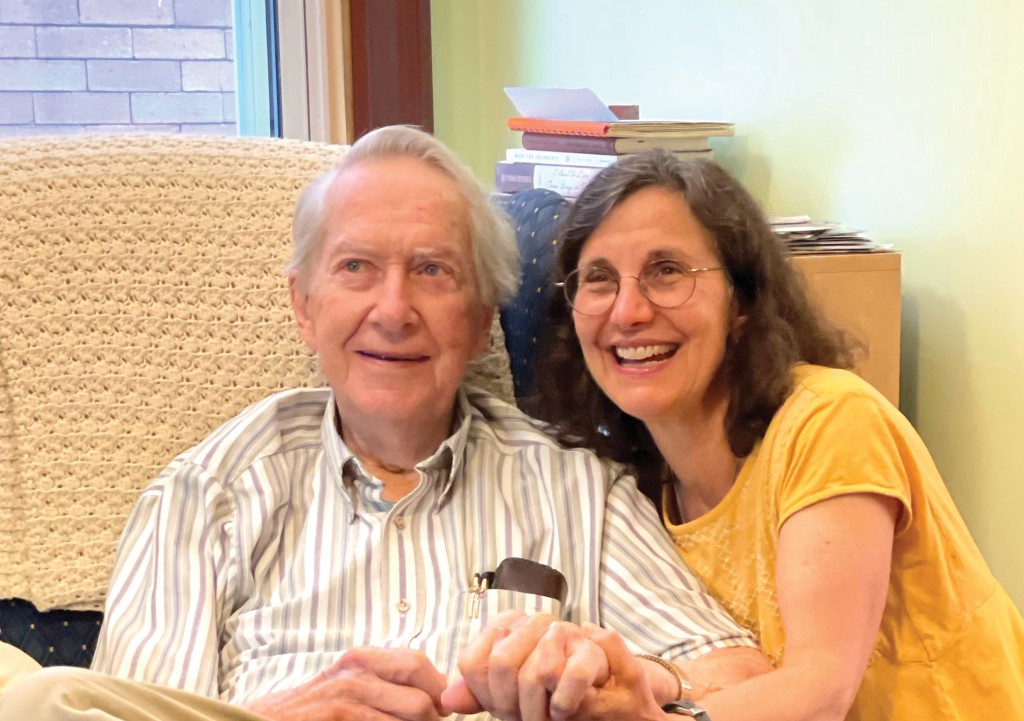Ken Smith, a retired pastor known for his role in the conversion of countless saints, died Oct. 11 at age 97.
While a pastor nearing retirement, he wrote a letter to Syracuse University professor Rosaria Champagne Butterfield, an atheist. It was simply another gospel inquiry he had made to scores of people over the years, from store clerks and barbers to educators and leaders. The letter stayed on her desk because she couldn’t decide whether to answer it or trash it. In time, Ken’s hospitable, Bible-centered friendship with Butterfield led her to study God’s Word for herself, and her life was dramatically changed by God (The Secret Thoughts of an Unlikely Convert, 2012).
Ken and his wife, Floy, who died in 2017 at age 91, have often been referenced as examples of witness to a hardened, “unreachable” sinner. They have also been used as examples of hospitality since they regularly hosted people for everyday meals or lodging, some for extended periods. For Ken, evangelism, discipleship, and hospitality were not things that could be contained in a method; they were to be the heartbeat of the Christian life. His practice was centered on the Bible’s teaching of the believer’s union with Christ. The Navigators ministry had impressed that on him as a young adult, and he has impressed the importance of it on thousands of people since.
In a 2014 interview, when asked “Why is discipleship, something that is so obvious, also so important for you to emphasize to believers?” Ken put it this way:
“It may not be so obvious to believers in the first place. It is generally passed over without much comment. Second, according to what I have learned from other theologians (Schaeffer, Murray, Pink, etc.), the fact that all believers died in Christ and rose in Him is true. That’s just the way it is. However, the ‘experimental’ aspect of that doctrine, or may I say ‘experiential,’ is not necessarily communicated just by making clear the doctrine. For example, Paul in Ephesians 1:15ff, writing to those whom he calls elect, prays that they would come to know—that’s existential, not cerebral—the ‘hope, riches, and power’ that were theirs in Christ.
“And he does the same in Ephesians 3:14ff. He’s praying these Christians will come to know (experience) the love of Christ. Reformed people are timid about going into the experiential of the Christian life, but according to Murray, that is where the dynamic of the biblical ethic rests. The ‘assurance of the indicative (I died with Christ and rose) underlies the imperative; and the assurance of the indicative provides the dynamic of the biblical ethic.’
“He goes on to say that, unless one is motivated by that union with Christ, it’s not the biblical ethic. The Lord taught me these things from the practical to the theoretic, not the other way around. When I began to realize Jesus was meeting with me as I read, studied, and memorized the Word, I became excited. I now knew experientially how to fellowship with Him in the Word and prayer. So I began to experience these things, then later went back to examine theologically what had happened to me. How I thank God for His grace in showing me these things! They underlie my whole concept of the Christian life and ministry.”
Butterfield said that Smith “preached and proclaimed a gospel of strong engagement with the world, unflinching hope in the gospel to save sinners, and fearlessness in the face of the intractability of certain sins. Ken and Floy were patient and firm.”
Kenneth G. Smith was born in Barnet, Vt., on Aug. 29, 1927. He served in the Navy at the end of World War 2. He married Floy Moody on Nov. 3, 1956. They are survived by three children, Kenneth A. (Becky) Smith, Gregory (Gitta) Smith, and Peter (Vicki) Smith as well as grandchildren and great-grandchildren. Ken graduated from the Reformed Presbyterian Theological Seminary in 1952 and was ordained by the Pittsburgh Presbytery of the Reformed Presbyterian Church the same year. He served as a pastor in Central Pittsburgh congregation from 1952–57 and as denominational director of Christian education from 1959–1970. He was evangelism director for the Reformed Presbyterian Church of Ireland in 1971-72. After coordinating a mission in Cyprus, he became pastor of Covenant Fellowship (Pittsburgh, Pa.) RPC in 1975, and then pastor of Syracuse, N.Y., RPC in 1993. He served on the board of trustees of Geneva College, and he was moderator of the RPCNA Synod in 1982. He died at the Reformed Presbyterian Home, just miles from two of the congregations he had pastored.
Ken Smith is author of With Him: A Biblical Model of Discipleship for Men, Learning to Be a Man, and Learning to Be a Family. He wrote a chapter about his experience with Rosaria Butterfield in The Secret Thoughts of an Unlikely Convert: Expanded Edition. A Bible overview that he used as a gospel presentation is available at KenGSmith.com
